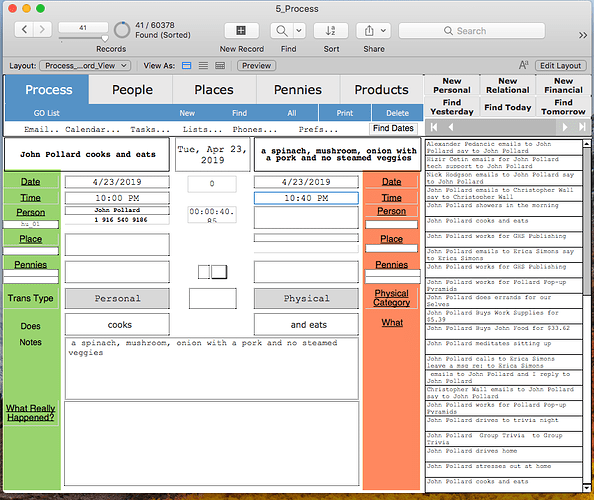[quote=“Sergio, post:8, topic:6807”]
Personal: Physical, Emotional, Mental, Spiritual
Relational: Family, Social, Work
Financial: Buy, Sell, Transfer
Environmental: Air quality, Weather, noise
[/quote]
Sergio,
Here’s one for you right off the bat. Spiritual is only mental, you have a non-existent category space there. It’s like math. Math is a thing, but it’s mental. Spiritual is a thing, but it’s categorized as mental as described below.
– A more general comment on deriving value from these datasets, I don’ t know if this is your case, but early on in my self-tracking experience,
– i decided to spend more of my time hammering away at the data, running experiments to see if there was something there. If i had to estimate the
– breakdown, I would venture to say it is 50/50 today in terms of time spent on the collecting part vs. the analysis and experimenting part.
I have zero idea what this means. What is “hammering away at the data.”
– Coming back to your comments, I am curious in your 25 years of self-tracking how you characterize
– the time spent on collecting activities vs. those related to analysis/experimenting.
My sole motivation for tracking what I do was to design and track a human person’s life from a generic pov. The only thing I care about is the unit of the human. Called generic human studies. It’s a concept that includes tracking all humans, of any color or stripe to the generic level. In this system, everyone gets “spiritual” for free. Whatever you say is spiritual is already right. I respect spiritual, I’m very spiritual. 
Think of a human as one cell in the human body of many other such like people cells to make up the human body.
Your other bolded categories are outside the GHS person molecule as part of the Environment which are valid to measure, but society measures those. I would import all that data.
This system has evolved and so far after 25 years talking about it never has anyone adopted it as I assumed everyone would. Here’s a screen shot of what I look at.
Every underlined word on the left clicks to an input source
There’s a start and end date/times.
“What really happened” is a contribution from ghs to humanity, as that’s what most people care about. I’ve explained my theories in the book, What is Generic Human Studies?.
So, to summarize, my goal for all this tracking was to prove the “concept” of ghs in some third-party objective way so other people could see for themselves. And I did. Filemaker is amazing software and it suited me to learn it.
It’s like a life-crm. If someone wanted to take me up on this idea it would behoove them to start using Filemaker.
I’d be willing to see what my system doesn’t do that anyone else’s does. Assuming you had total human data available to you, what would you want to know? What do you care about? What’s important to you?
John
 -)
-) Actually, it “needs” to be on the phone, it was meant for the phone.
Actually, it “needs” to be on the phone, it was meant for the phone.


